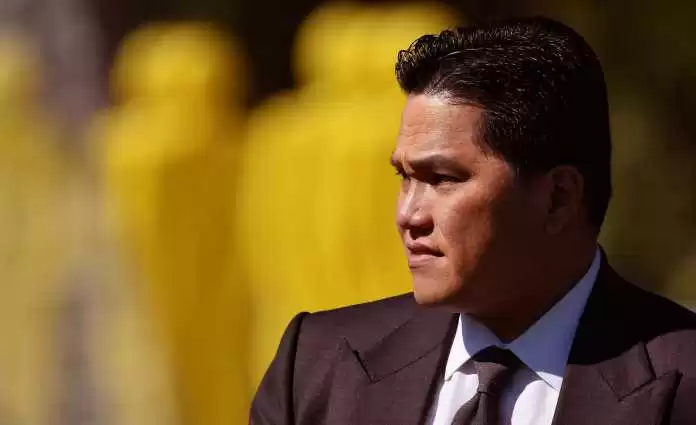 Indonesian state-owned enterprises (SOEs) grew rapidly under the first Joko Widodo (Jokowi) government. SOEs’ assets increased from Rp 4,578 trillion (equivalent to 43.3 per cent of GDP) in 2014 to Rp 8,092 trillion (54.6 per cent of GDP) in 2018. This expansion was a result of the government’s significant capital injections in 2015 and 2016, as well as other support measures such as tax incentives for asset revaluation. State financial institutions also acted as important financiers.
Indonesian state-owned enterprises (SOEs) grew rapidly under the first Joko Widodo (Jokowi) government. SOEs’ assets increased from Rp 4,578 trillion (equivalent to 43.3 per cent of GDP) in 2014 to Rp 8,092 trillion (54.6 per cent of GDP) in 2018. This expansion was a result of the government’s significant capital injections in 2015 and 2016, as well as other support measures such as tax incentives for asset revaluation. State financial institutions also acted as important financiers.
Under Jokowi, the principal goal of many SOEs has shifted from providing fiscal revenues in the form of tax and dividends to conducting and financing development projects. Despite frequent delays, there has been visible progress in infrastructure projects. Many projects that had been stuck for years, in some cases decades, due to financial and regulatory risks, are being implemented by SOEs.
The draft economic strategy for the next five years suggests that SOEs will continue to play a key role in conducting numerous projects for infrastructure development, balanced growth, and industrialisation.
Jokowi has again chosen a non-party figure who has been his close aide to drive the SOE-centred strategy. Rini Soemarno, the previous minister of SOEs, was the head of the transition team for the first Jokowi administration. Erick Thohir, the new minister, was Jokowi’s campaign team leader for the second presidential election.
Can SOEs continue acting as the ‘agents of development’ over the next five years? The future trajectory of Indonesia’s developmental state capitalism will depend on how Jokowi manages the following three issues.
The first of these issues is the relationship between the Ministry of SOEs and other ministries.
During the first Jokowi administration, SOE-centred projects were often closely monitored by other government ministries led by officials without political party affiliation. For example, the Ministry of Finance, the Ministry of Public Works and Public Housing, and the Ministry of Transport played a vital role in overseeing and influencing the pace and quality of SOE projects.
In the second administration, these ministries will be led by the same officials as the first. Considering the growing role of state financial institutions under the Ministry of Finance as SOEs’ financiers, this ministry is expected to play a particularly important role in assessing SOE projects’ viability and finances.
To sustain SOE-centred development strategy, significant energy will be required in balancing the views and co-ordinating the mandates of different ministries.
The second of the issues is the relationship with the Ministry of SOEs and the House of Representatives.
Rini aggravated the House of Representatives from early on as she attempted to put a fence around SOEs. Rini sent a letter to the House of Representatives asking politicians to refrain from inviting officials of the Ministry of SOEs to hearings until further notice. Rini was then prohibited from attending meetings at the House of Representatives from December 2015, at which point a special inquiry committee uncovered a corruption case involving a port-operating SOE. Although the minister’s direct connection to this case was not proven, the committee recommended that Jokowi dismiss her. Rini also had an uncomfortable relationship with Megawati Sukarnoputri, chairwoman of the largest political party in the House of Representatives.
Despite these conflicts, Jokowi stood by Rini for five years, making her the longest serving minister of SOEs in history.
Many observers have argued for the need to improve the relationship between the Ministry of SOEs and the House of Representatives. Certainly, the conflictual relationship contributed to making state capital injection into SOEs and state-owned holding company establishment more difficult. However, this tension was partly the side effects of Jokowi’s efforts to make key SOEs focus on their developmental mandates rather than being entangled in political horse trading.
It is yet to be seen whether Jokowi will continue to guard the Ministry of SOEs from party politics to an extent to which the ministry can concentrate on development projects.
The final issue is the relationship between the minister of SOEs and his close circle.
The fact that the new minister of SOEs is deeply embedded in Indonesia’s business world needs to be considered.
Rini also has a business background, having worked for Astra International, one of Indonesia’s largest conglomerates, in the 1990s. In comparison, Erick is a key figure among Indonesia’s capitalists.
Erick currently owns a media group. His father, the late Teddy Thohir, was one of the first-generation executives (often ambiguously called ‘co-founders’) of Astra International. Erick’s brother, Garibaldi Thohir, the 16th richest Indonesian in 2018, is co-owner and president director of Adaro Energy, Indonesia’s 13th largest listed company in terms of revenue. Adaro Energy is one of the major miners and is rapidly diversifying into infrastructure sectors. Adaro Energy is also co-owner of a power plant set to be Indonesia’s largest when its operation commences in 2020.
Adaro Energy’s other main shareholders include Theodore Rachmat (17th richest), another ‘co-founder’ of Astra International, and Arini Subianto (44th richest), a daughter of another ‘co-founder’. They oversee separate business empires, Triputra Group and Persada Capital Investama, respectively.
Edwin Soeryadjaya (45th richest) is another main shareholder of Adaro Energy. Edwin’s father was the leading founder of Astra International, which has since been taken over by a foreign holding company. Moreover, Edwin has co-founded a private equity firm, Saratoga Investama Sedaya, with former Jakarta Deputy Governor and multi-millionaire Sandiaga Uno. This firm is another key shareholder of Adaro Energy. Also, Sandiaga previously sat on the board of directors for Adaro Energy and has been a close friend of the new minister of SOEs.
Erick’s brother Garibaldi is also linked to ride hailing unicorn Gojek which is often referred to as Indonesia’s most successful startup. Garibaldi became Gojek’s commissioner in July 2019. Then in October 2019, he became Gojek’s president commissioner to supervise the new CEOs when Gojek’s co-founder and CEO Nadiem Makarim stepped down to join Jokowi’s cabinet as the new minister of Education and Culture.
As Adaro Energy, its major shareholders’ conglomerates, and even Gojek are Indonesia’s leading companies, we may see business deals between these firms and SOEs. Civil society will be watching closely to see whether these deals are conducted transparently and fairly.
While ‘petty’ rent-seeking of SOE officials need to be taken seriously, the type of corruption that will make the government lose legitimacy for the developmental use of SOEs is that which involves high-ranking public officials. When and if the next Hambalang case is exposed, the voters will begin questioning SOEs’ developmental role.
With regard to corruption, political efforts to weaken the role of Corruption Eradication Commission (KPK), which has been active in uncovering cases involving SOEs, is a key concern.
Developmentalist strategies in countries such as Brazil and Malaysia, whose SOEs the Indonesian government previously studied ended with large-scale corruption cases. SOEs were the main tools in these scandals which simultaneously involved party politicians, government officials, and countries’ leading businesses.
Jokowi should bear in mind what has happened to the political leaders of these countries.




